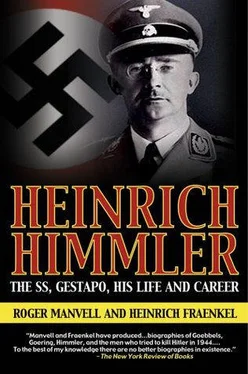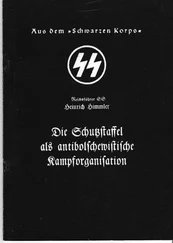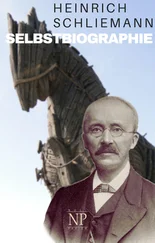During the period he was gradually increasing the range of his power and influence, Himmler had realized it was no longer either proper or practical for him to continue as a farmer. The small-holding in Waldtrudering had been sold, and he had removed his wife and family, who now included an adopted boy called Gerhard as well as his five-year-old daughter Gudrun, to Lindenfycht at Gmund at the head of the beautiful lake of Tegernsee, some twenty-five miles from Munich. 1When he took control of the Gestapo in April 1934, he moved his official residence to Berlin and settled in a villa at Dahlem, a fashionable suburb where Ribbentrop also lived. His headquarters in Berlin were at the Prinz Albrechtstrasse, where Goring had established the Gestapo; Heydrich’s headquarters were set up near-by in the Wilhelmstrasse.
Himmler’s domestic life was meagre. He had no strong feeling for the woman he had married; his passionate devotion was to his work in Berlin, and this led to a gradual separation which, although it was never made formal, was none the less real. 2Marga stayed in Gmund, and this remained to the end of Himmler’s life his solidly bourgeois family home. Marga’s frequent letters, no longer sentimental as they once were, are full of domestic chatter about the weather, her husband’s clothes, the losses and gains in the vegetable and fruit garden and complaints of his infrequent visits: ‘We look forward to your visit… Don’t bring along so many files and other things to read. We want a bit of your attention too.’ From as early as 1931, she began to address him in her letters as ‘Mein Lieber Guter’, and when he is away she seldom fails to remind him, as always, that the housekeeping money is due. Marga was undoubtedly a good and frugal housewife, scraping the last penny of value out of the money her husband gave her, but her husband’s long absences hardened her. Her social station in life did not rise with his, since she could not come to town and share it with him. As early as October 1931 she writes naively about the good news for the Nazis, adding, ‘How I’d like to be present at all these great events.’ But Himmler kept her as firmly as possible in the background. She was, nevertheless, very conscious of being the Herr Reichsführer’s wife, and dealt with the local tradespeople on those terms, driving as hard a bargain as she could in the process. They much preferred to deal with Himmler, who, when they encountered him during one of his visits, seemed to them far more human and less socially pretentious. He loved his daughter Gudrun, and it was to see her rather than Marga that he came to Gmund.
Marga had two sisters, Lydia and Bertha; Bertha on 19 April 1936 received an official letter from her brother-in-law which began:
‘I am told that you’ve been in our office again making tactless and bloody silly (saudumne) remarks. I herewith forbid you (i) to enter my office; (ii) to telephone anyone in my office except myself or S.S. Brigadeführer Wolff… Henceforth you are to refrain from any remarks about S.S. matters and personalities. All departmental chiefs have been acquainted with this letter. Heil Hitler!’
He accused Bertha of making adverse remarks about Heydrich and saying that when he, Himmler, was absent from Berlin she had to run the office for him.
Himmler’s relations with his parents during their final years were friendly and correct. He set his father the task of research into the family ancestry, and a letter about this, sent by the old man from Munich in February 1935, begins: ‘My dear Heinrich, this time your father does not come to you with a request but to give you something’, while his mother scribbles a postscript saying how proud she feels to see her son’s name and picture so often in the papers. But, she adds, he should not work too hard; he must look after himself, and come and see them soon in Munich.
Himmler called to see his parents whenever he could and sent them for drives in his official car, carefully noting that the cost of the fuel should be deducted from his salary.
Himmler’s removal to Berlin preceded by barely a month Hitler’s sudden and savage assault on Roehm and his associates at the head of the S.A. We know that the decision to undertake this purge was not taken lightly, for Roehm, in spite of his threatening ambitions and his moral corruption, was a man towards whom Hitler still felt loyalty and even friendship. It is possible that he was afraid of him. At this early stage in his career as dictator he disliked taking any violent, widespread and public action which might lead to consequences he could not wholly foresee and which he feared he might be unable to control. But Himmler and Goring were determined to be rid of Roehm and break the influence of the S.A., and they joined together in the common cause to persuade Hitler that the commander of the S.A. and his dissatisfied forces were planning a coup d’état.
Roehm had made difficulties for himself by using the place he had won in Hitler’s Cabinet to urge that the S.A. (which now numbered 3 million men) and the regular Army should be merged under a single command that he clearly wanted to assume himself. Hitler, who had his own eye fixed on Hindenburg’s Presidency now that the old man was within a few months of his death, had struck a secret bargain with the High Command of the Army and Navy, agreeing that he would disband the S.A. if they would acquiesce to his becoming President. The S.A., in fact, was no longer of use to him, and its unruly presence in the state was a constant embarrassment now that the campaigns in the streets were won and the sureties of power lay in gaining final control of the armed forces themselves. He had in any case promised Sir John Simon and Anthony Eden, when they had visited Germany on 21 February as Ministers of State, that he would demobilize two-thirds of the S.A. and permit an Allied inspection of the rest.
Heydrich’s files were gutted for evidence that would blacken Roehm and the commanders of the S.A. in the eyes of Hitler, and prove they were conspiring with other acknowledged dissidents, such as the subtle and devious Schleicher, whom Hitler had displaced as Chancellor, and Gregor Strasser, who had in 1932 attempted to draw a radical section of the Nazi party away from Hitler’s authority and was now living in retirement. According to an affidavit made by Frick, Hitler’s Minister of the Interior, and filed at the time of the Nuremberg Trial, it was Himmler rather than Goring who finally determined Hitler to take action. 3
Himmler had spent the first weeks of the new phase in his command touring the principal centres where his S.S. detachments were stationed and addressing them on the subject of loyalty to the Führer. In Berlin, Heydrich was preparing for Goring the lists of those members of the S.A. who should be seized. On 6 June, Heydrich’s S.D. was proclaimed by Hitler the official Intelligence office of the Party, from whom no information they required should be withheld. S.A. leaders in Berlin and the south were kept under constant watch.
The pace of events that led to the bloody climax of 30 June began to quicken. Hitler ordered Roehm to give all his storm-troopers a month’s leave from July 1st, and Roehm himself, with Hitler’s agreement, went on a nominal sick-leave to Bavaria on 7 June. He maintained a formal contact with Hitler, who even promised to visit him for further discussions on 30 June. After a conference with Hitler in Berlin on 20 June, Himmler claimed he was shot at while driving in his car to the interment of the body of Carin, Goring’s first wife, in the mausoleum Goring had built at his great country estate of Carinhall, named after her. 4
At the Nuremberg Trial, Eberstein described how ‘about eight days before 30 June’ he was summoned and told that Roehm was planning a coup d’état. Himmler ordered him to hold his S.S. men ‘in a state of quiet readiness’ in their barracks. Eberstein also gave an account of how the local executions were conducted under orders from Heydrich:
Читать дальше











